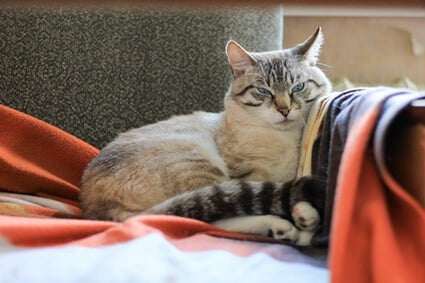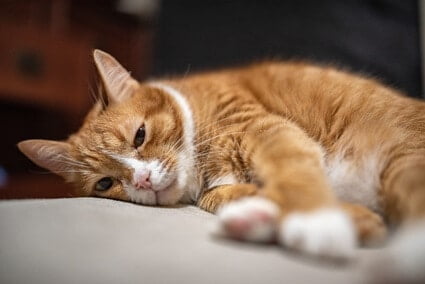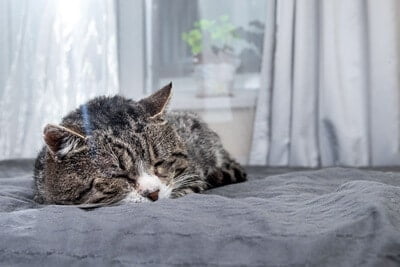All cats sleep a lot, but older felines take this to the next level. A senior cat may spend up to 20 hours per day asleep. Deep sleep is important, as it allows aging, aching limbs and muscles to rest and repair. Unfortunately, feline bladder control also weakens with age.
Encourage your cat to eliminate whenever it is awake, providing easy access to multiple litter boxes. Bathe your cat regularly, as it will struggle to feel clean. Diagnose the cause of incontinence as older cats struggle to manage their bladders and bowels. Common explanations include muscle weakness, arthritis, kidney failure, and UTIs.
Incontinence is the scourge of many senior cats. It will typically plague a cat at all hours, whether awake or asleep. As older cats sleep deeply, it becomes increasingly likely that incontinence will strike while slumbering.
Old Cat Lost Control of Bladder
When a cat is dozing, it flits between two states. REM, or Rapid Eye Movement, is a lighter sleep. The cat’s brain is still active. This means that, should the cat need to eliminate, it will likely wake up. Severely incontinent cats will soil the bed at this stage, but it is less likely.
A cat that pees while napping is likelier to be in deep sleep. When a cat enters deep sleep, the brain temporarily closes down. The cat will breathe deep and even, and not respond to any stimulus. More importantly, the body is completely relaxed.
Deep sleep is important to older cats. While REM sleep helps a cat clear its mind, deep sleep repairs the body. As many senior cats are arthritic, this will be essential. Deep sleep is an opportunity for muscles to regenerate and repair after walking and hunting.
Unfortunately, it can be difficult to wake a cat in deep sleep. This means the cat may not wake up when it needs to eliminate. In younger, healthier cats, that is not a problem. The cat will simply empty its full bladder upon eventually waking. An incontinent cat lacks the bladder muscles for this. The cat will urinate without even realizing.

What Causes Incontinence in Cats?
Incontinence is a broad term, covering any form of involuntary elimination. There are two forms of incontinence that can impact felines. Urinary incontinence is a weakness of the bladder. Fecal incontinence sees a cat unable to control its bowels.
Many senior cats struggle with incontinence. Most explanations involve a medical diagnosis. Some cats simply struggle to control their bodies as they age, though. Signs that your cat is growing incontinent include:
- Regular wetness and dampness around the legs and abdomen
- Inflammation and moistness around the genitals
- Regular trails of urine or feces following your cat
- Scent of urine on a cat’s fur
An incontinent cat may also spend a disproportionate amount of time in the litter box. This could include sleeping. The cat understands that it is struggling to control its bladder or bowel. It is staying close to the safety of the litter box for this reason.
Incontinence in itself is not an illness. It is a symptom of a different concern. To this end, seek medical advice if your cat is incontinent while sleeping. Tests will be run to determine what is causing these issues.
Urinary Incontinence in Elderly Cats
Urinary incontinence is more common in felines than fecal incontinence. This condition will see the cat regularly urinating outside the litter box. As per The Veterinary Record, female senior cats are likelier to develop urinary incontinence.
A one-off incident is not an undue cause for concern. Cats of all ages can occasionally have an accident. If the cat is regularly urinating in its sleep, seek advice. There will be an underlying explanation.
Weak Muscles
In senior cats, incontinence while sleeping may be due to weakness muscles around the urinary tract. This is especially likely in females that have birthed multiple litters of kittens.
While sleeping, your cat will have even less control over its muscles. In a deep sleep, the cat’s body will be completely relaxed. This can lead to inadvertent leaking of urine. This may just be a dribble, or it could be a full emptying of the bladder.
Speak to a vet about this issue. Your cat may be eligible for diagnosis of a muscle stimulant. This will give your cat greater control over its urinary tract. The cat is likelier to hold out until it wakes up. It can then make its way to a litter box.
Do not just write off your cat’s sleeping incontinence as old age, though. While weakened muscles will play a part, they may not be solely responsible. A medical concern will magnify the existing problem.
Arthritis
Arthritic cats struggle to move as a matter of course. Couple this with weak urinary muscles and you have a recipe for incontinence. The cat may struggle to make it to a litter box on time. Alternatively, the cat may be reluctant to move at all as it hurts to do so.
In addition, arthritic cats fall into a long, deep sleep with greater frequency. This is because the cat’s tired muscles need this time to recuperate. This, in turn, makes incontinence while sleeping likely. The cat’s bladder fills while it spends prolonged periods of time asleep.
Attempt to ease your cat’s muscular pain with supplements and massage. The more mobile your cat feels, the more it will move around. This means that you can encourage your cat to eliminate during waking hours.
You should encourage your arthritic cat to eliminate whenever it is awake. This will be more effective that hoping that a cat’s bladder or bowel muscles strengthen. If a cat has no urine or feces left to pass, it cannot become incontinent while sleeping.
Diabetes
Veterinary Clinics: Small Animal Practice explains how older cats are at an enhanced risk of diabetes. This is typically due to reduced activity levels that are not matched by a declining appetite.
There are two behaviors commonly linked with diabetes in felines. Lethargy, and an increased need to urinate. Your cat is likely to sleep more, continually finding its bladder full while doing so.
While your cat is dozing, this will manifest as incontinence. The cat will be unable to control its bladder while sleeping off an energy crash.
Diabetes must be managed with medication, alongside diet and lifestyle changes. Failure to do so will make sleeping incontinence the least of your cat’s concerns.
Urinary Tract Infections
A common explanation for urinary incontinence in cats is urinary tract infections. Female cats of middle age and beyond are most at risk of UTIs. This becomes increasingly prevalent if the cat has not been spayed.
A UTI is a bacterial infection in the cat’s urinary tract. This will make the cat’s elimination habits erratic at best. Be vigilant about spotting the signs of a UTI. These include:
- Struggling to pass urine, possibly leading to pained verbalizations
- Spotting and blood in the urine
- Urine that smells excessively of ammonia
- Dribbling urine
Most UTIs can be cleared up with a course of antibiotics. This is a one-off remedy, though. The infection may return. If your cat is prone to UTIs, and associated sleeping incontinence, more tests will be required.
Renal Problems
Senior cats are often at risk of kidney problems. The Australian Veterinary Journal studied 184 cats with renal issues. The median age was between 12 and 15. This is why senior cats should attend regular check-ups.
Sleeping incontinence is a symptom of renal failure, but it usually manifests late in progression. Other warning signs to look out for include:
- Bad breath
- Lethargy and depression
- Loss of appetitive and associated anorexia
- Unexplained vomiting
- Excessive thirst
When we combine two of these symptoms, we have an explanation. Your cat will drink to excess, filling its bladder. Cats with renal failure rarely feel appropriately hydrated. The cat will then be exhausted, falling into deep sleep. Urinary incontinence while dozing will follow.
Renal failure is initially treated with medication, but a specialist diet will also be required. Early intervention is pivotal to treating this dangerous condition. Always take your cat for a check-up at least once a year. Consider moving it forward if that cat urinating during sleep.
Cognitive Decline
It is also possible that your cat is experiencing cognitive decline. Any cat older than 10 is at risk of some symptoms of senility. Once a cat reaches 15 or older, it becomes increasingly likely.
As per The Journal of Small Animal Practice, eliminating outside the litter box is a symptom of feline cognitive decline. Other warnings include:
- Excessive verbalization and clinginess
- Reversed sleep-waking cycles
- Seeming not to recognize owners and other pets
- Staring into space
- Uncharacteristic aggression
- General disorientation
It is the latter that will lead to urinating during sleep. The cat will grow confused about what activities it performs, and where. Even if the cat is not in a deep sleep, it may have an accident.
Cognitive decline is a natural part of feline aging. It can be slowed by keeping the cat’s mind sharp, though. Conduct regular refresher courses on litter training. In addition, work to keep your cat clean. Senile cats often forget to groom themselves.

Fecal Incontinence in Elderly Cats
Fecal incontinence is less common in cats. Typically, a cat living with fecal incontinence will experience sudden diarrhea. This may occur while the cat is sleeping. As you can imagine, this is distressing for the cat.
Fecal incontinence can be difficult to diagnose. Many feline ailments, both mild and severe, involve diarrhea as a symptom. Explosive diarrhea alone, whenever it may occur, is not automatically considered fecal incontinence.
Compendium on Continuing Education for the Practicing Veterinarian references, “various anal, gastrointestinal or neuromuscular disorders” as a cause of fecal incontinence. Only a vet will be able to elaborate on this broad definition.
There are other potential explanations for fecal incontinence in cats, though. Many of these involve injury or damage to the rectum or sphincter. Examples include:
- Muscle or nerve damage
- Scarification following a surgical procedure
- Hemorrhoids
- Rectal prolapse
The upshot will always be the same. A cat will struggle to control its bowel, especially while in a deep sleep.
These problems can also be harder to treat. Surgery may help, or the cat will be placed on medication. If the fecal incontinence cannot be cured, it will need to be managed. Never leave a cat to wallow in its own mess.
Managing Incontinence in Senior Cats
Living with an incontinent cat can be deeply frustrating. While it is unpleasant to clean up urine or feces, it is worse for your cat. Once you have identified and diagnosed the root cause of the incontinence, it should clear up. You can still do more to aid your cat, though.
Affixing your cat with a feline diaper is one option. This is not dignified, though. Many cats will reject this option and become distressed. This will cause further problems with incontinence. Never force a cat to wear a diaper against its will.
Minimize the impact of sleep incontinence by purchasing puppy training pads from a pet store. They will perform the same task for an incontinent cat. Place the pad in a cat’s bed, or on a preferred sleeping cushion. This reduces the risk of ammonia scent and staining on fabric if the cat urinates.
In addition, consider some lifestyle adjustments. Litter boxes are the most important adaptation. Place multiple litter boxes in the home, so your cat does not need to travel far.
You will also need to help your cat stay clean. Senior cats often struggle to groom in the best circumstances. Incontinence will apply an additional layer of urgency. Check your cat, using wet wipes to clean up any staining.
A cat experiencing incontinence while sleeping is always a concern. The cat can still live a full and happy life, though. Even if the problem is caused by old age, adjustments can be made. Just remain calm in the face of an accident and focus on caring for your pet.


I am trying to find what medication I can give an elderly cat with incontinence, wetting the bed while sleeping.